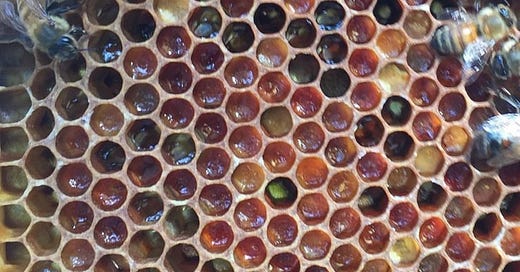As I navigate a new ocean all about pollen—it’s benefits and how to harvest it—I’ve learned a few statements, or community beliefs, that actually aren’t true. Help spread the word and educate others about these misconceptions.
Myth 1: If I eat pollen and I swell up, I’m allergic to pollen.
Truth: A semi-truth may exist here. One, would you know exactly which floral source(s) the pollen is from? Pollen is typically sold with seasonal collection, so you could have granules from a number of different plants in a single teaspoon of pollen. The allergy could be specific to a certain plant and not the broad bucket of “pollen.” For instance, if you had a peanut butter cake and had a reaction, would you say you’re allergic to all cake? You could have a peanut allergy. Learning the root cause can help identify inflammation triggers and prevent exposure.
Two, you could have an undiagnosed or misdiagnosed condition such as pollen food allergy syndrome (often referred to as oral allergy syndrome). Unlike typical respiratory, dermatological, and eye irritations associated with seasonal allergies, pollen food allergy syndrome can also manifest as migraines and gastrointestinal issues. According to Rush University Medical Center, some individuals with “birch pollen allergies might react negatively to carrots, celery, apples and peaches, while those allergic to ragweed may need to avoid melons and tomatoes in addition to bananas.” For example, one could consume pollen, which doesn’t trigger a reaction, but they consume a food related to a different pollen that the person is allergic to and they could misappropriate the source of the reaction. Perhaps uncommon, but something to consider.
Myth 2: Goldenrod causes fall seasonal allergies.
Truth: Goldenrod blooms in late summer and early fall, which happens to be the same time as ragweed. Goldenrod is non-allergenic, produces nectar, and its pollen particles are heavy and sticky, which means you won’t find them blowing on the wind. Ragweed is a nectarless plant with light pollen particles that can ride the wind for miles. Goldenrod actually has medicinal uses in folk medicine. It’s known to help reduce inflammation, help treat kidney stones, and manage urinary tract infections.
Myth 3: Honey helps seasonal allergies because of the trace amounts of pollen.
Truth: Honey might provide comfort (coating an itchy throat) from seasonal allergies, but there is no scientific evidence that supports a connection with pollen ingestion through honey and mitigating seasonal allergies. Check out my earlier post for a deep dive on this.
Does honey support seasonal allergies?
I don’t turn folks away from buying local honey, but when they tell me their reason is because of allergies, I encourage them to consider the science. It’s a fairly ubiquitous belief in our culture that local honey can help tamper seasonal allergies. The notion is so pervasive that we just assume it’s true. The beliefs that I commonly hear revolve aroun…





